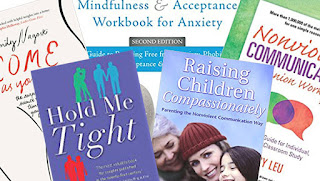Book recommendations for Book Lover's Day

Every day our practitioners work with people dealing with anxiety, stress, anger and phobias; issues with their families, children or young people; relationship difficulties; and many other issues and problems. We asked them for their recommendations for books that may be helpful when dealing with such issues. Here are their suggestions. We will update with more books throughout the day! Books on anxiety, stress and phobias The Triune Brain in Evolution: Role in Paleocerebral Functions, 1990, by Paul D MacLean (Recommended by R. Victor Morton, Senior CBT Psychotherapist) The Mindfulness and Acceptance Workbook for Anxiety: A Guide to Breaking Free From Anxiety, Phobias, and Worry Using Acceptance and Commitment Therapy, 2016, by John P. Forsyth and Georg H. Eifert (Recommended by Tasim Martin-Berg, Consultant Counselling Psychologist) Full Catastrophe Living, Revised Edition: How to cope with stress, pain and illness using mindfulness meditation, 2013, by Jon Ka...
